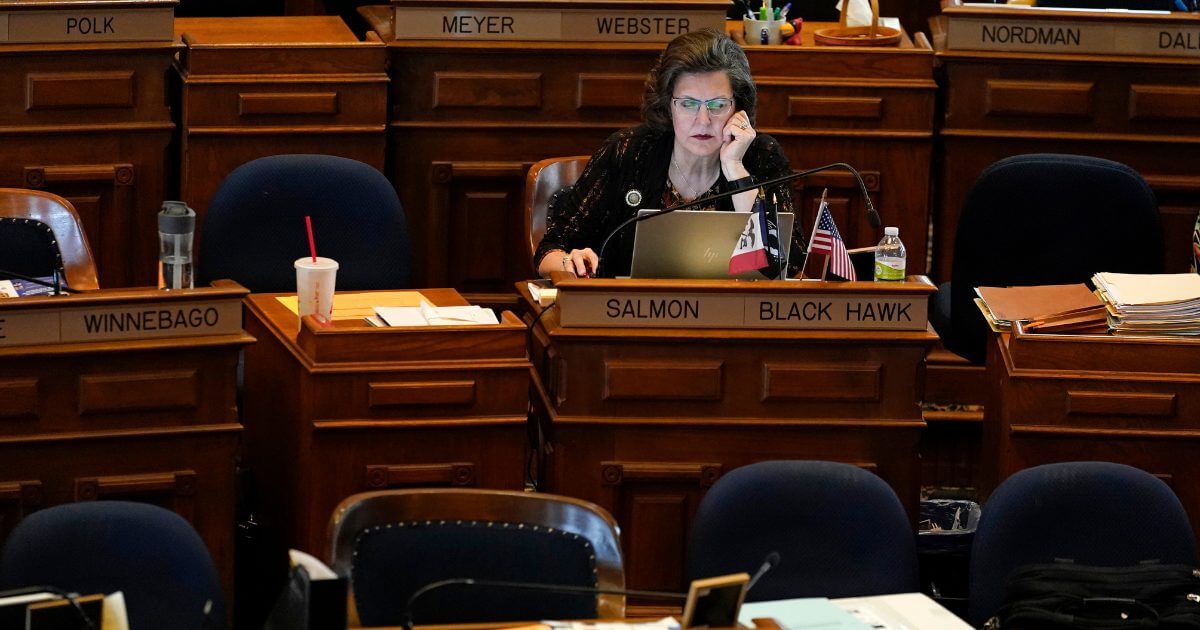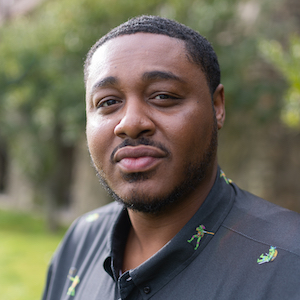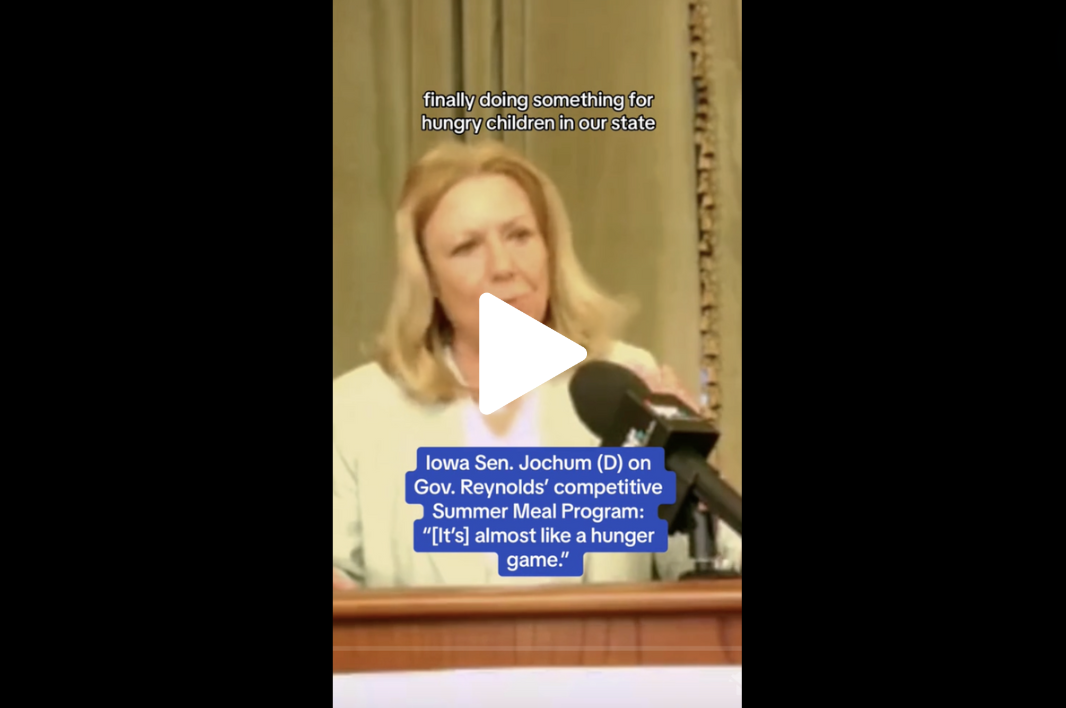
AP Photo/Charlie Neibergall
Iowa Sen. Sandy Salmon (R-Janesville) is hellbent on removing social-emotional learning (SEL) from the state’s public schools, and she has a small but vocal and politically-motivated group of supporters backing her.
Salmon introduced a bill to ban the Iowa Department of Education from promoting SEL and chaired a Senate subcommittee that voted to move the bill forward.
The senator and her supporters say SEL is a backdoor to promote LGBTQ ideology, a tool for indoctrination, a violation of some parents’ political and religious beliefs, teaches morality, and it contains critical race theory, a legal framework that is not taught in Iowa’s K-12 schools and that was already prohibited.
“The delivery vehicle for all of this now is what’s called ‘transformative SEL,’ transformative social-emotional learning,” Salmon said during a Feb. 2 Moms For Liberty town hall.
Salmon told the crowd she’s only against “transformative SEL”—and she said the same thing in her newsletter—but her bill would stop the Iowa Department of Education from mentioning SEL in any form. Also, the word “transformative” doesn’t even appear in her bill.
What’s really inter—
So is Sen. Salmon right about SEL?
Oh, hey there. The short answer is “no.” The Iowa Department of Education’s website lists five key parts of SEL: self-awareness, self-management, social awareness, relationship skills, and responsible decision-making.
[inline-ad id=0]
Cool, you threw a lot of words at me, but what’s SEL mean in plain English?
“Put really simply: social and emotional learning is really the way that we develop important life skills that help us navigate all parts of our lives. So these are skills like communicating effectively, like practicing curiosity or staying motivated and making decisions that benefit ourselves and other people.”
That’s how Justina Schlund of the Collaborative for Academic, Social, and Emotional Learning (CASEL) explained it to me. She even gave me an example of how it could be used in the classroom.
Let’s say you’re a third-grader getting frustrated by a tricky math problem. Instead of getting mad and giving up or acting out in class, you would pause, reflect, and try a different approach to solving the problem. Or, you could work with a partner or in a small group which allows you to practice your collaboration and teamwork skills and learn to listen to another person’s perspective on the situation. Once you have an answer to the problem, you could share it out loud with your class as a way to practice communication skills.
Essentially, being able to understand and manage one’s own emotions, especially at a young age, helps a child set aside distractions and be in the best spot to learn and interact in a productive way with other people.
“What the research has shown is that when they approach learning in this way, it actually deepens their learning and engagement in the academic content,” Schulnd said “So it helps them to be more successful in the classroom.”
Did you ask anyone else?
I did! The other person was Alyson Finley, the student services director for Des Moines Public Schools. Here’s what she told me:
“Social-emotional learning provides the skills to both adults and youth to be able to recognize and understand their emotions, feel empathy, make positive and healthy decisions, and build and maintain positive relationships with others,” she said. “It is just as important, if not more, that the adults supporting youth in schools have these skills in order to cultivate safe (both emotionally and physically) learning environments where students can thrive, excel, meet personal goals, and be successful in their lives.”
Wait, I know what Des Moines Public Schools is, but who are these CASEL people?
Both DMPS’ and the Iowa Department of Education’s SEL framework is based on CASEL’s work and research, which is why I thought it was important to go straight to the source.
CASEL is a Chicago-based nonpartisan, nonprofit organization created to establish high-quality, evidence-based SEL in education. In fact, you could even say that CASEL coined the term social-emotional learning.
Where did SEL even come from? I feel like I’m only just hearing about it and most of the political chatter is negative.
It’s not new. CASEL was founded in 1994, but conversations around SEL started well before the term was formally coined, according to Schlund.
“There was a lot of activity happening in the ’70s and the ’80s where educators and researchers and parents were really sort of coalescing around the same insights and findings around students’ learning, which was basically that their social, emotional and academic growth were all deeply connected,” she said.
Some of the findings were that students learn by how emotionally connected they were to the material and that strong relationships and support in the classroom can help them perform better. Schuland said researchers in different fields came to the same conclusions and were talking about these findings when the foundation for CASEL was laid.
“We brought together, in the mid-90s, educators, parents, folks from neuroscience, from child development, from education science, from all aspects of this to talk about ‘how do we really support children’s learning and development,’” Schuland said.
“And from that conversation and many conversations, CASEL was born. And what we do is we provide evidence-based guidance and resources for schools and districts to use to be able to implement really high quality social and emotional learning.”
[inline-ad id=”3″]
And how did it get to Iowa classrooms?
As I said above, the Iowa Department of Education based its SEL guidance on CASEL’s work. The departed started working on its SEL process in 2017 and it engaged with stakeholders from every corner of the state. Iowa collaborators included students, school districts, area education agencies, colleges, youth service organizations, and more. Nationally, the department worked with CASEL (obviously) and the American Institutes for Research.
The department didn’t officially roll out its SEL framework until the beginning of the 2020 school year, which was after years of work. Here’s a detailed list of the steps the department took and the names of most of the people who worked on the years-long process:
The development and rollout process was similar for Des Moines Public Schools (DMPS), according to Finely.
“During the 2018-2019 school year, the school board held community engagement sessions and invited students, families, community members, and DMPS staff members to address the following two questions: What is the impact you want our school system to make on our students? What do you want students to know and be able to do?
“In 2019, based on the community feedback, the DMPS school board adopted math and literacy goals and made safety and SEL a priority and board management limitation.”
Starting in April 2020, DMPS began to systematically implement SEL at all levels and departments.
“While SEL seems like a new ‘buzzword’ or process, it has always been an integral part of education,” Finley said. “Schools should be safe spaces for students to learn and grow and be prepared for life outside of school in the community.”
[inline-ad id=”1″]
So this wasn’t just something schools rolled out overnight?
Nope!
But is SEL replacing parents’ role in teaching kids about morals and values?
Again, nope! Parental buy-in and collaboration is necessary for it to work.
“One of the key indicators for SEL implementation is authentic family partnerships,” Finley said. “We want families to have regular and meaningful opportunities to collaborate with schools and teachers. We know students are more successful when there are positive relationships between families and schools.”
This all sounds reasonable, but can you provide some real-world examples of how it is used?
Sure, so in the Van Meter School District, a teacher has morning meetings with her students. During recent meetings, students were given the option to share something they enjoyed over winter break and were encouraged to create a goal for the New Year or identify an area they would like to improve. And, again, this was optional.
That’s it?
Yup! I got another example for you. A freshman student at a Des Moines high school contacted Finely after she noticed how hard the district’s transportation department and bus drivers worked The student wanted to do something kind for those folks. With an assist from her assistant principal, the student developed a plan for all the students in her school to write cards to their bus drivers. On Valentine’s Day, the bus drivers will receive those cards and some treats.
That’s a nice story, but how does that fit in with SEL? Just sounds like “Iowa Nice.”
I’ll let Finley explain this part: “This student took the initiative, on her own, to create and implement a plan to make someone else feel good. She is displaying that she has Social Awareness and can see the perspective of others. She is recognizing the strengths in other members of the school community and is expressing gratitude. She is showing her relationship skills by communicating effectively with different departments across the district and showing leadership in her school. This student is showing self-awareness by demonstrating her efficacy and agency to create a plan on her own and share it with students across the school.
“One single student did this. So, it would be interesting to imagine the ripple effect we could have if we had a world of people who value themselves and others did something similar.”
[inline-ad id=”2″]
Again, this doesn’t sound all that bad, but I noticed you haven’t directly countered the senator’s accusations around indoctrination, socialism, Marxism, CRT, and the LGBTQ agenda.
SEL has been under attack nationally since 2021 give or take and it is often attached to the ongoing vilification of CRT—which, again, is not something taught in K-12 school—and public education, but the practice and terminology existed long before then (see above). Here’s a good NPR story that talks about this and another story from the Washington Post.
Also, as embarrassing as it was, I did ask Finley and Schlund about the things Sen. Salmon and some of her supporters have mentioned. They both vehemently deny these connections.
“There’s a lot of politics out there and politicking out there,” Schlund said. “I will just emphasize the point I made earlier, which is social-emotional learning is about helping students develop their own perspectives and points of view to listen to diverse perspectives of their peers, of others in their communities, and to be able to take all that information and make good decisions for themselves to achieve their goals, to contribute to their communities.
“The other thing I’ll say is if you want children to be prepared for the world at large, for the future that they will be inheriting, they need to be able to learn how to communicate with people who are different than them, to be able to listen to diverse opinions, to be able to understand who they are in relationship to other people. And that’s all part of social and emotional learning.”
Anything else?
Did I mention that SEL is optional? The Iowa Department of Education provides a framework and resources, but districts can choose whether or not they will use it. Also, it was implemented under Gov. Kim Reynolds’ administration, you know, the same woman who signed the law that outlaws CRT in Iowa?
by Ty Rushing
02/09/23
[inline-ad id=”0″]
If you enjoy stories like these, make sure to sign up for Iowa Starting Line’s main newsletter and/or our working class-focused Worker’s Almanac newsletter.
To contact Senior Editor Ty Rushing for tips or story ideas, email him at [email protected] or find him on social media @Rushthewriter
Iowa Starting Line is part of an independent news network and focuses on how state and national decisions impact Iowans’ daily lives. We rely on your financial support to keep our stories free for all to read. You can contribute to us here. Also follow us on Facebook and Twitter.
Politics

Biden marks Earth Day by announcing $7 billion in solar grants
The Biden administration on Monday announced the recipients of its Solar For All Program, a $7 billion climate program that aims to lower energy...

6 terrifying things that could happen if the Comstock Act is used to target abortion
Does 1873 sound like a really, really long time ago? Well, that’s because it is—but if Republicans and far-right anti-abortion activists have their...
Local News

No more Kum & Go? New owner Maverik of Utah retiring famous brand
Will Kum & Go have come and gone by next year? One new report claims that's the plan by the store's new owners. The Iowa-based convenience store...

Here’s a recap of the biggest headlines Iowa celebs made In 2023
For these famous Iowans, 2023 was a year of controversy, career highlights, and full-circle moments. Here’s how 2023 went for the following Iowans:...






